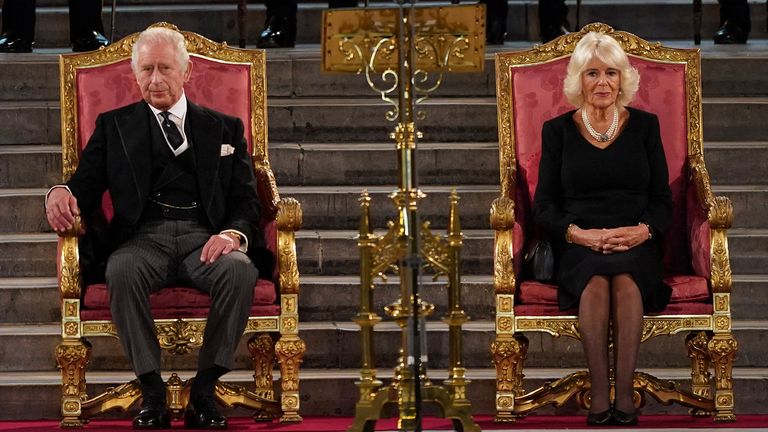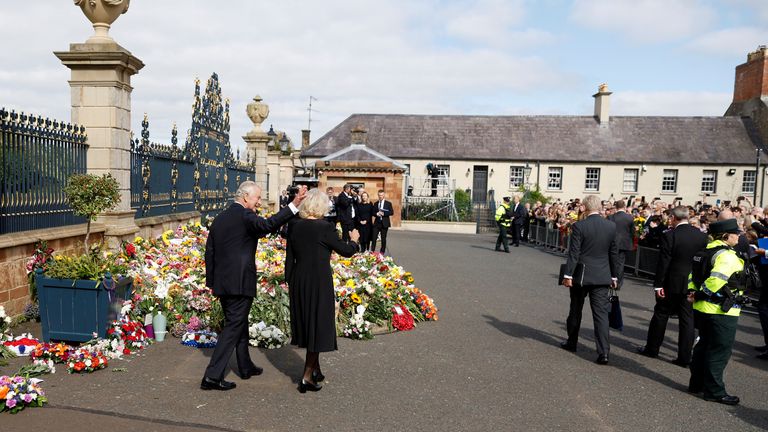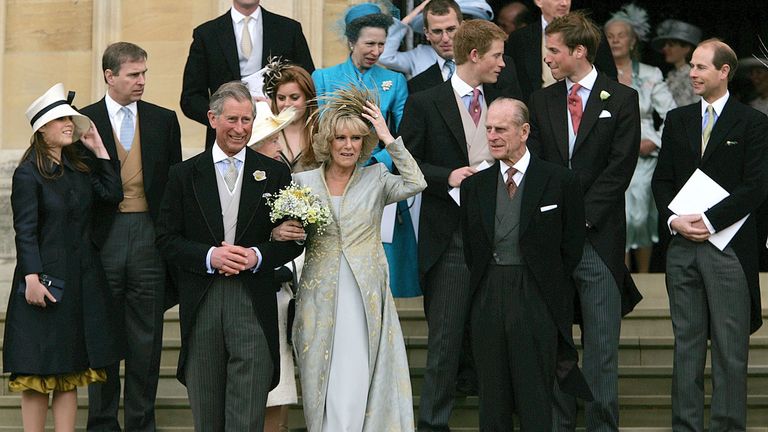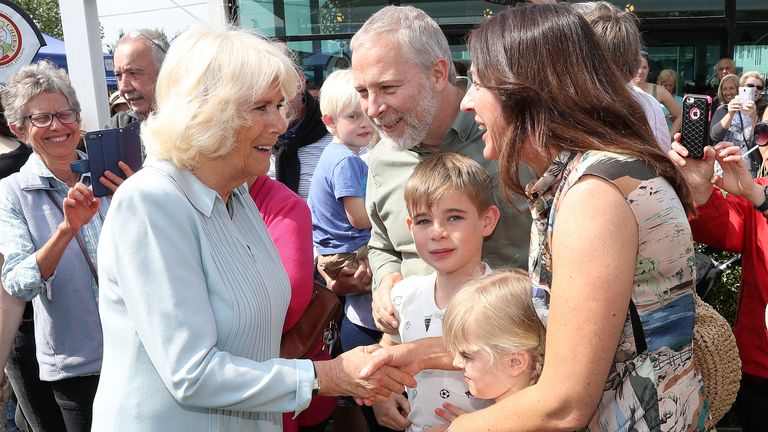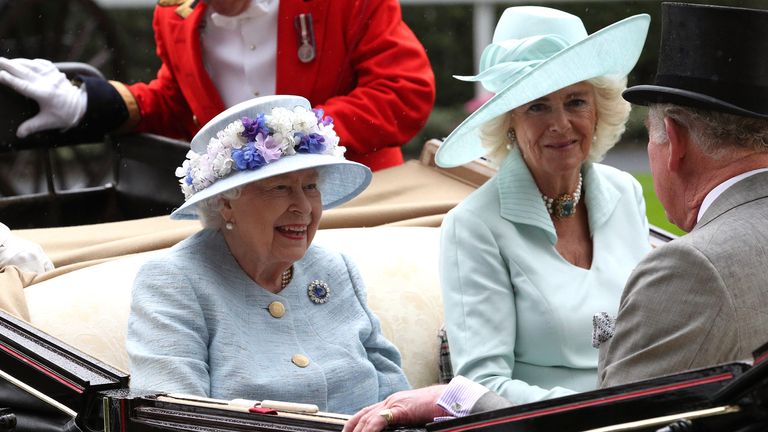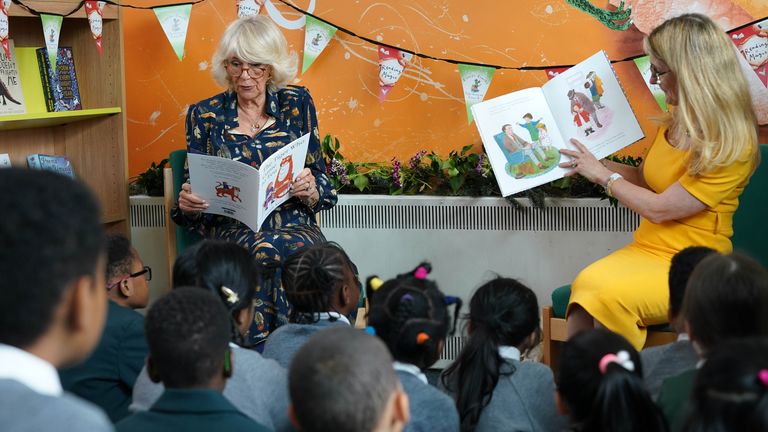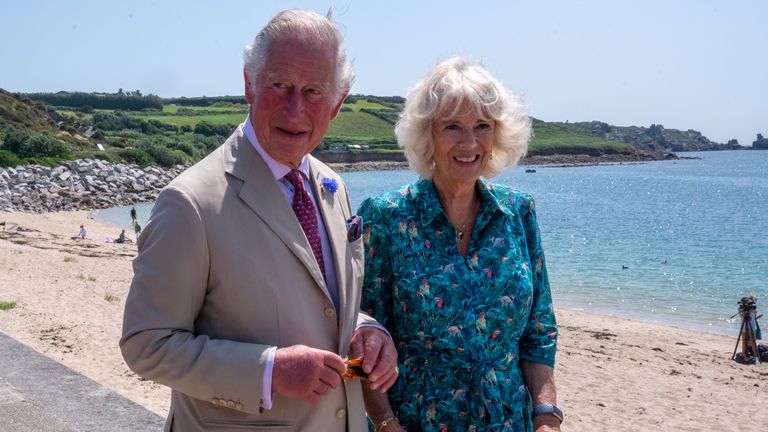Why Camilla will be crowned during King's coronation - and why it seems her title will change to Queen after the coronation
The Queen's 2022 Platinum Jubilee statement said it was her "sincere wish" that Camilla should be known as Queen Consort on her death - although Buckingham Palace appears to have decided to drop the second part of that title.
Friday 28 April 2023 10:57, UK
Camilla will be by the King's side when he is formally crowned.
The Queen Consort will also be anointed and crowned during the ceremony for King Charles III at Westminster Abbey on 6 May 2023.
What will happen at the King's coronation?
While plans for his investiture have been in place since his mother's coronation in 1953, her part was only confirmed when during her Platinum Jubilee the Queen declared Camilla would be known as Queen Consort on King Charles's accession.
However, it appears she will be known as Queen Camilla following the coronation, after Buckingham Palace used the title for the first time on invitations.
Camilla has been referred to as Queen Consort since the death of Queen Elizabeth II - who expressed in her Platinum Jubilee message in February last year her "sincere wish" that Camilla be known as "Queen Consort" following the end of her reign.
But she is named Queen Camilla on the invites, which were being sent to more than 2,000 guests.
Be the first to get Breaking News
Install the Sky News app for free


'A similar, but simpler ceremony'
Following the King's six-part coronation ceremony, Camilla will have her own one.
According to the Royal Family's website: "A Queen Consort is crowned with the King, in a similar, but simpler ceremony."
The last Queen Consort to be crowned was the Queen Mother alongside King George VI in 1937.
The Archbishop of Canterbury anointed her head with holy oil - a ritual also carried out with the monarch.
The Queen's ring was then placed on her hand, her crown on her head, before she was presented with a sceptre and an ivory rod.
It ended with her bowing "reverently" to her husband.
Camilla will also be anointed with holy oil and crowned.
Read more about the King's coronation:
The meaning of the crowning ceremony explained
Odd traditions of coronations past and present
Little known facts about the King's coronation
Why is Camilla Queen Consort?
When the King and Queen Consort married in 2005 - eight years after the death of Diana, Princess of Wales - she let it be known that she intended to use the title "princess consort". It would be a first in the history of the British monarchy.
The decision was seen as an acknowledgment that the public was finding it difficult to accept her new role, after years of speculation in the media over their affair, the bitter divorce of Charles and Diana, and Diana's death in 1997.
For the same reason, upon marrying King Charles, who was Prince of Wales at the time, she decided not to use the Princess of Wales title, which had been used by Diana.
Instead, she chose the Duchess of Cornwall, styling herself on her husband's other title the Duke of Cornwall, which is always given to the heir presumptive.
Reflecting on the negative press she received during that period, in an interview with British Vogue, Camilla admitted it "wasn't easy".
"I was scrutinised for such a long time that you just have to find a way to live with it," she said.
"Nobody likes to be looked at all the time and, you know, criticised... but I think in the end, I sort of rise above it and get on with it."
Civil wedding
At the time, there were also legal questions surrounding the validity of the couple's civil wedding - which might have added to the decision to opt for princess consort.
They married in a civil ceremony at Windsor Guildhall. But under the Marriage Acts 1753 the only type of marriage valid for a member of the Royal Family is a religious one.
In 2005, the Lord Chancellor sought to defend the validity of their marriage, but Palace aides feared that breaking precedent could have meant more unwanted legal challenges over other titles in the future.
Princess Consort or Queen Consort?
According to common law, wives of kings are known as queen consorts, but the husbands of queens only prince consorts.
As a result, the Duke of Edinburgh was known as Prince Philip - and not given the title of King when he married the Queen.
He did not have his own coronation, but 'paid homage' to his wife during her ceremony instead.
Camilla becomes more popular
After the wedding, Camilla's popularity started to grow - and so did calls by her supporters to make her Queen Consort.
A YouGov poll carried out in late 2021 ranked her as the 10th most popular royal, beating Prince Andrew, whose popularity plummeted due to his association with convicted paedophile Jeffrey Epstein, and Princesses Beatrice and Eugenie.
Royal author Penny Junor said: "The problem with Camilla was that she was involved with the Prince of Wales and was what Diana famously called the third person in the marriage."
But she added: "When she then married him, she was out and about and people met her. They realised that actually, she wasn't this ghastly woman, a rottweiler, she was actually very nice.
"She's funny, she's warm, she's friendly, she's self-deprecating, she's interested in other people."
Royal observers also noted she took on more responsibilities after Andrew, Harry and Meghan stepped back from royal duties.
The King was long thought to have favoured the title of Queen Consort. According to Sky News royal correspondent Rhiannon Mills, while the issue hadn't occupied his mind "on a weekly basis", it was nonetheless "something he wanted addressed".
The debate over Camilla's title could have also acted as an unwelcome distraction at the start of his reign, she adds.
Queen's Jubilee statement appeared to end years of uncertainty
In February 2022, as her Platinum Jubilee celebrations got under way, the Queen surprised the nation by announcing that Camilla would be known as Queen Consort when Charles III took the throne.
She said in a statement: "When, in the fullness of time, my son Charles becomes King, I know you will give him and his wife Camilla the same support that you have given me; and it is my sincere wish that, when the time comes, Camilla will be known as Queen Consort as she continues her own loyal service."
This effectively put an end to nearly two decades of uncertainty over her position within the Royal Family.
It also served as a way to thank Camilla for years of royal duties - and as recognition the public had warmed to her in that time.
Rhiannon Mills commented: "The Queen clearly wanted to use this opportunity to thank Camilla who over the past 17 years has rolled her sleeves up, embraced the sometimes less glamorous royal engagements and in Her Majesty's eyes shown herself to be a worthy future consort, in the mould of Prince Philip and the Queen Mother."
Since the death of Elizabeth II, Camilla has been referred to as "Queen Consort" to distinguish her from the late monarch.
However, the wording of the invitation indicates that after the coronation, "Consort" will be dropped.
What will her role be?
Camilla has taken on a number of causes in recent years, such as raising awareness of domestic violence, sexual abuse or illiteracy.
But royal observers say her main role will be supporting the new King.
"She is to Charles what Prince Philip was to Elizabeth. She is not in competition with him. She is there purely to support him," said Ms Junor, the royal author.
In her 2022 British Vogue interview, Camilla said that balancing her marriage to Charles with their royal work "is not easy sometimes", but the couple always make sure to "sit down together and have a cup of tea and discuss the day".
Constitutional expert Craig Prescott described her as the King's "secret weapon, or not so secret weapon".
He said: "She has become sort of one of the more interesting members of the Royal Family, taking up interest in causes, domestic violence, the importance of childhood reading, the importance of live theatre during the pandemic, and sort of the need to speak up for the creative industries.
"Despite the difficulty she had in the 90s with the media, she seems very open, very relaxed - and that might be sort of actually the model that the monarchy will take in the future."
Sir Peter Westmacott, former deputy private secretary of King Charles, also noted the strong bond between the royal couple.
"She has made such a difference to his life all this time. He adores her and vice versa," he said.
"It is an invaluable partnership."

